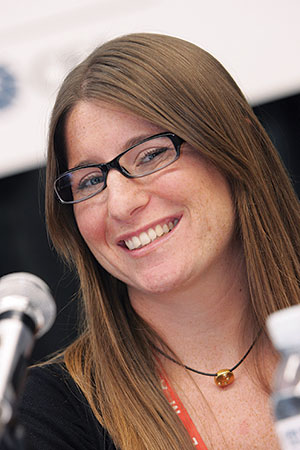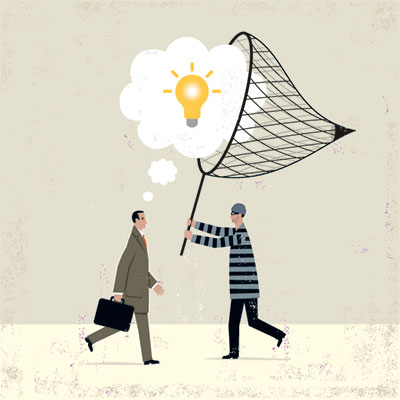
As the Mark Cuban Chair to Eliminate Stupid Patents at the Electronic Frontier Foundation, Julie Samuels ’05 possesses one of the most intriguing and amusing titles in the legal profession—and a unique advocacy job.
In January, after stints as an intellectual property litigator in Chicago with Loeb & Loeb and Sonnenschein Nath & Rosenthal, Samuels joined the EFF, which has the broad mission of advocating for “digital civil rights.” A major focus of her work as a staff attorney is patent reform, particularly with regard to software patents, to ensure the system fosters rather than inhibits innovation.
A billionaire entrepreneur not noted for his diplomacy, the outspoken Cuban was moved to fund Samuels’ position by his growing frustration of watching small software companies in which he invested “have to fight or pay trolls for patents that were patently ridiculous,” he said in an interview with TechCrunch, a web publication focusing on startups. As an example, Cuban cites Acadia Research, which claimed ownership of the concept of sending medical images over the Internet and then threatened to sue image-transmission software developers and their clients for infringement. “Patent trolls are costing taxpayers and small businesses money that could otherwise be used for innovation and creating jobs,” Cuban said in announcing Samuels’ appointment to the newly created position.
The “troll” problem isn’t a small one. Patent trolls—more politely referred to as “patent aggregators,” “patent assertion companies” or “nonpracticing entities”—threaten to sue roughly a third of software startups. Aggregators acquire or file software patents and then “assert” them by threatening legal action against software entrepreneurs. Samuels visited VLS on February 25 to join a panel discussion organized by students in the Vanderbilt Intellectual Property Organization. She emphasized that “non-practicing entities” use patents they own solely for generating revenue through licensing fees or settlements. The threat of a costly lawsuit can have a chilling effect on startups that lack the financial resources to pay high fees or fight an infringement lawsuit. In June, President Obama issued an executive order calling for patent reform, citing concerns that “patent trolls” are stifling innovation in an industry in which entrepreneurial startups provide “an important development engine” for the nation.

A major issue related to the rise of patent assertion companies, Samuels explained, is that the pace and technological sophistication of software innovation has long since outstripped the ability of the U.S. Patent Office to determine when a patent should be granted. “Software patents are a fairly new construct, and the way the technology works is different from most other technologies, so there’s a lot of disconnect and instability,” she said. “What you have is a culture of wanting to get as many software patents as you can. There are a lot of bad patents out there now and no way to know whose hands they’re going to end up in. Some software patents are so broad and so vague, the system doesn’t really work. In fact, the system incentivizes the non-practicing entities.”
Samuels sees no silver-bullet solution to balance the need to foster innovation with the legal right to defend patents. But she touts a current bill known as the SHIELD (Saving High-Tech Innovators from Egregious Legal Disputes) Act proposed by Representatives Peter DeFazio and Jason Chaffetz. It would require non-practicing entities engaging in patent assertion suits to pay court costs and legal fees of companies and individuals they sue if they lose because their patent is invalid or there was no infringement.
“Right now, it’s really easy to be a troll,” Samuels said. “The business model is really easy, and it’s really hard to fight back. We need to make it harder to be a troll!”